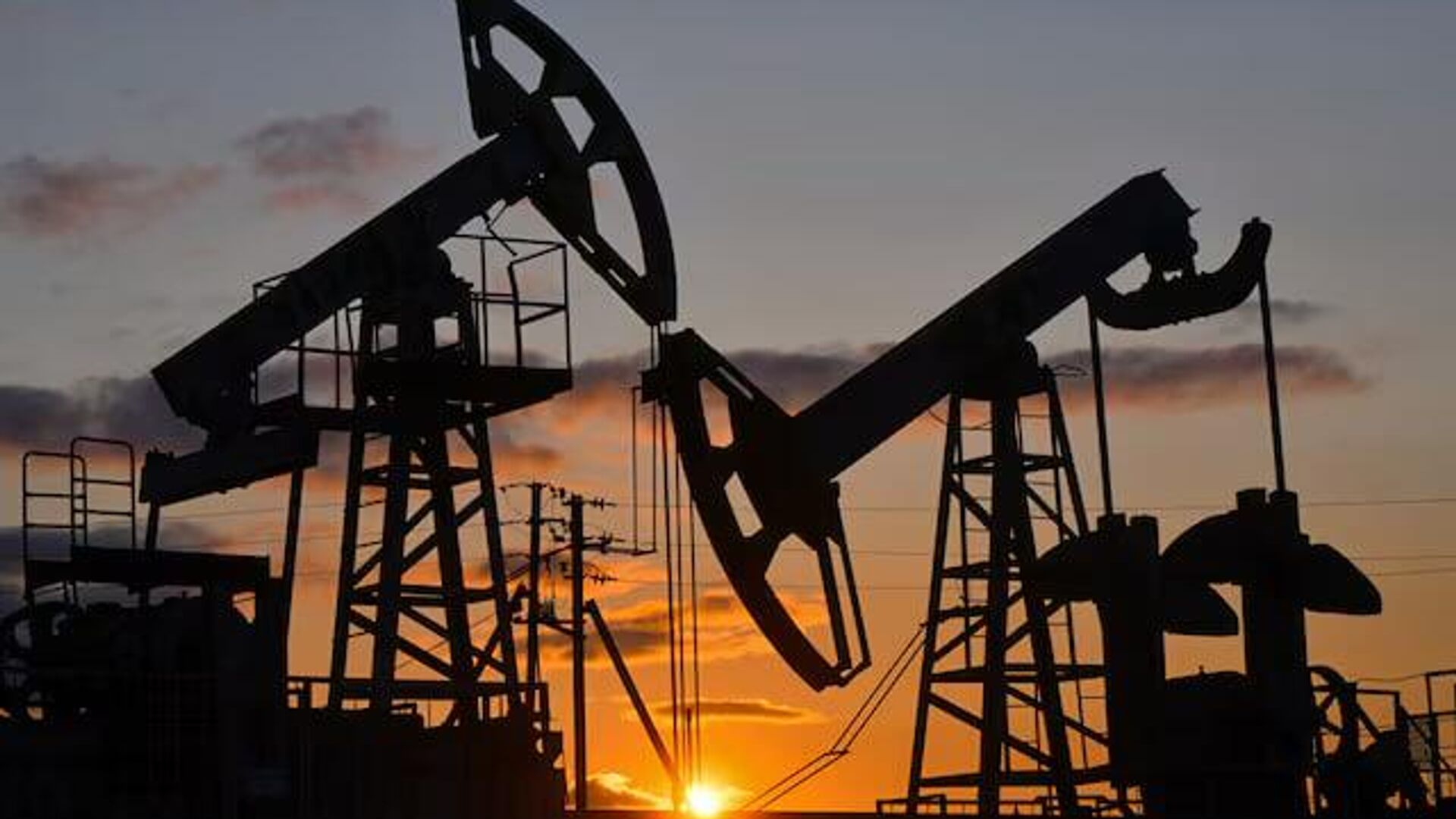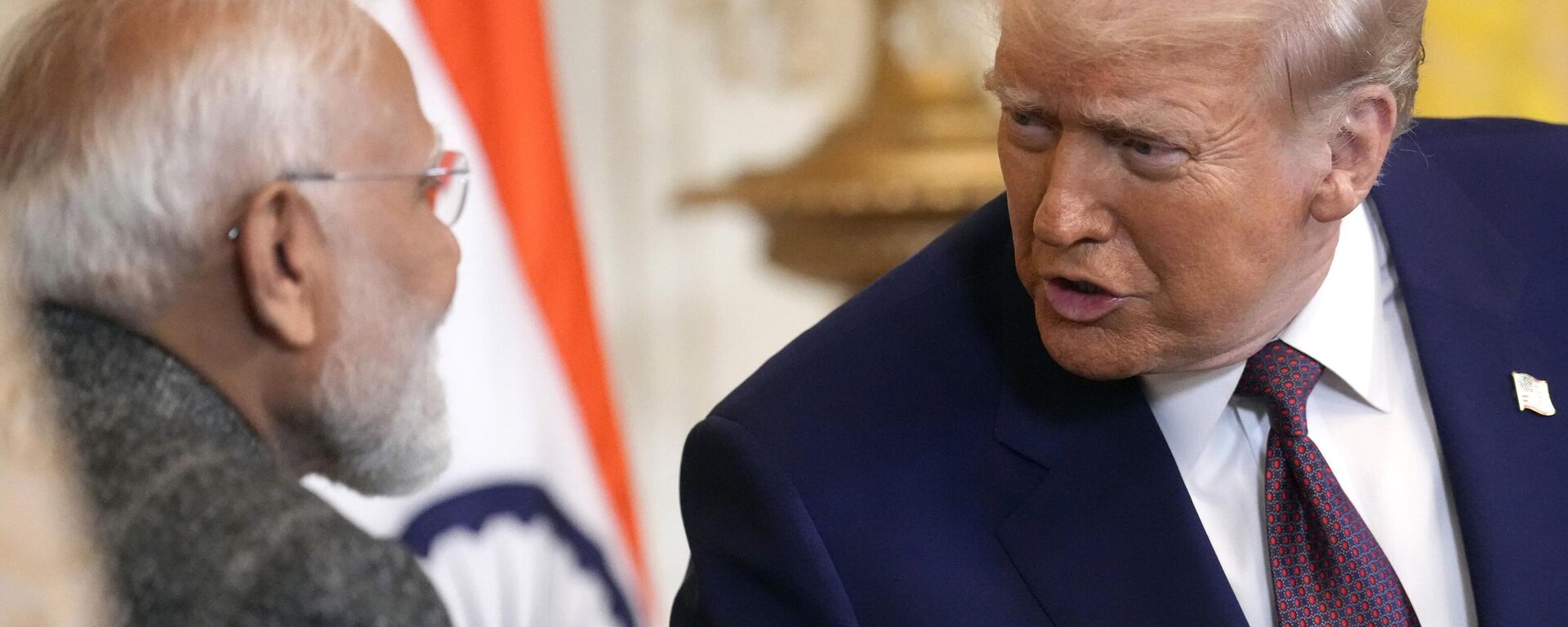Indian Public Detests Trump's Pressure on Russian Oil: Experts

© Photo : Social Media
Subscribe
Indian Ministry of External Affairs (MEA) Spokesperson Randhir Jaiswal said on Thursday that New Delhi was analysing the impact of US sanctions on Russian oil firms (mainly Rosneft), while stressing the importance of securing "affordable energy" to ensure energy security for India's 1.4 billion people.
The Indian public is firmly against yielding to US President Donald Trump's pressure to force New Delhi to stop buying Russian crude, according to an analysis of Indian social media user reactions over the past several weeks and Indian experts.
Discourse on Indian social media, mainly X, shows that around 80% of the sampled posts view Trump's threats as "bullying" coming at the expense of India's energy security, Grok says.
While most pro-government voices in India have supported the government's stance on continuing to source crude from Russia in the face of US pressure, many Indian opposition supporters have sought a direct response from Prime Minister Narendra Modi rebutting Trump's claims (that he has been assured by the Indian leader on cutting down supplies of Russian oil).
Highlighting this sentiment on Indian social media, ruling Bharatiya Janata Party (BJP) politician Savio Rodrigues said in no uncertain terms that India's energy policy has and will be driven solely the country's "national interest" rather than whims of a foreign capital, be it any country.
"Our 1.4 billion citizens depend on affordable energy, and as the world’s fastest-growing large economy, we simply cannot allow imported politics to dictate our domestic priorities," the BJP politician said.
Petroleum Minister Hardeep Singh Puri told an energy conference in Hyderabad this week that India relied on imports to meet around 88% of its crude requirements, importing around 300 million metric tonnes of crude in 2024-25 FY and the country projected to contribute to around 30-33% of the global demand growth in coming decades.
Echoing comments by Prime Minister Modi (made to President Vladimir Putin at their Kremlin meeting in July last year) as well as statements by Finance Minister Nirmala Sitharaman and other Indian ministers, Rodrigues said that importing Russian oil has helped stabilise inflation in India. In March 2022, as European suppliers diverted their energy sourcing away from Russia, higher global fuel prices spurred retail inflation in India to hit a 17-month high of nearly 7%.
"The Indian public understands this far better than many global analysts do. They know that Russian crude has played a crucial role in keeping our inflation under control, fuel prices stable, and economic growth steady during global turbulence. When the world was struggling with soaring energy costs, India - under Prime Minister Narendra Modi’s leadership - made pragmatic decisions that shielded our people from the worst of it. That’s not ideology; that’s governance with a conscience," remarked Rodrigues.
Referring to President Trump's repeated claims of having been assured by PM Modi on Russian oil or his allegation that he forced New Delhi and Pakistan to a ceasefire using trade during Operation Sindoor, the Indian politician said that the Indian voters have "little patience for external commentary that questions our sovereignty".
"We respect America as a strategic partner, but we expect the same respect in return. The Indian public detests the habit of foreign leaders using India as a talking point in their domestic politics. The days when India needed validation from the West are long gone," he stated.
On a macro-level, Rodrigues said that Russia's popularity in India surpassed that of the US, which was due to decades of time-tested ties underpinned by cooperating in defence, space, energy, and now, trade resilience.
The US is viewed as a powerful partner for technology and global influence, but Russia is still seen as a "time-tested friend that stood by India when few others did", he said, a reference to the 1971 India-Pakistan War.
"In short, the Indian public’s stand is simple: energy security is non-negotiable, sovereignty is sacred, and interference is unacceptable," the politician concluded.
Commodore (retired) Seshadri Vasan, the Director General of the Chennai Centre of China Studies (C3S), stated that the general sentiment in India supports the government's energy policy, which includes the decision to source crude from Russia.
"This is critical to address India's growing energy demand and maintain a healthy GDP growth rate. We know that the Trump administration has done a U-turn on the question of Russian crude, as the previous Biden administration had been clear that India should buy Russian crude to stabilise the energy markets," Vasan pointed out.
He said that Trump's claims of having forced India to stop Russian oil imports or having brokered the India-Pakistan ceasefire for that matter were being taken with a "grain of salt", be it among the general public or in the strategic community.
"Most Indians are firmly behind the government's decisions on the matter. Prime Minister Modi has rightly delegated the task of responding to these claims to the Indian diplomats, while not wanting to get involved in a public spectacle," Vasan commented.
Having said that, India continues to pursue trade talks with the US in hopes of securing a fair bilateral trade agreement (BTA). As a rising power with global ambitions, India must continue to firmly pursue a policy of strategic autonomy, building its domestic capabilities, while at the same time advancing ties with all the major powers," the Indian Navy veteran said.
No Long-Term Structural Changes in India's Russian Oil Imports
At the same time, the Ministry of External Affairs (MEA) also said that India also "naturally takes into account the evolving dynamics that are there in the global market".
Several big Indian refiners, namely Reliance Industries Limited (RIL) and state-backed Indian Oil Corporation Limited (IOCL), have appeared wary of attracting US sanctions in the wake of President Trump's announcement last week, given their exposure to US capital markets and US Dollar (USD)-centred financial institutions.
An RIL Spokesperson has told the media that the company is the process of recalibrating its Russian oil imports in alignment with Government of India (GOI) guidelines ahead of the 21 November deadline set by US Treasury, while Indian Oil management has told investors that it would continue to import Russian oil as long as the company complied with sanctions.
IOC is believed to have brought five parcels of Russian crude this week for December delivery from non-sanctioned entities, it has been reported.
RIL, one of the world's biggest importers of Russian crude since 2022, reportedly signed a 500,000 barrels per day (bpd), 10-year deal with Rosneft last year. Nayara Energy's refinery in Gujarat, an entity partly owned by Rosneft, has also been a major Russian oil importer in India. Meanwhile, state refiners such as Indian Oil and Hindustan Petroleum Corporation Limited (HPCL) have also imported significant quantities of Russian oil since 2022, with India's total imports averaging 1.6-1.8 million bpd during the period.
In upstream Indo-Russian Joint Ventures (JVs), a consortium of Indian state refiners - Oil India Limited (OIL), IOCL and Bharat PetroResources, own a stake in Rosneft-owned JSC Vankorneft and Tass-Yuryakh Neftegazodobycha oil fields in Russia.
Despite the visible short-term trends, energy market analysts have forecast that India would continue to import Russian oil in medium to long term, an argument supported by an underlying reality that Russia contributes 8-12% of crude to the global energy output and removing such a player from the market would put pressure on global prices, which may rise to upwards of $100 a barrel.
An analysis by HDFC has predicted that any decision to pull the plug on Russian oil supplies in India could cause "short-term market disruption" and put pressure on Reserve Bank of India's (RBI) inflation targets, while Kpler has also ruled out any "structural changes" in India's energy landscape in view of US threats.
In fact, London Stock Exchange Group (LSEG) data reported by Reuters on Thursday showed that new US and EU sanctions against Russian oil have failed to dent crude exports as of now, with an average of 2.33 million barrels per day (bpd) of oil leaving Russia's western ports in October.


